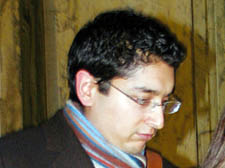|
|
 |
| |

Dr Roohi Singh |
Baby death probe blames ‘systemic failure’ at hospital
Junior doctor who admitted mistake escapes ban as casualty unit tightens procedures
A JUNIOR doctor who admitted he made an error by missing “vital signs” that a baby was fatally ill has escaped a practising ban.
Dr Roohi Singh, 26, also avoided a written warning from the General Medical Council (GMC) which would have remained on his career record for five years.
Instead, an investigating panel blamed University College London Hospital (UCLH) in Bloomsbury for “systemic failure” after hearing how Dr Singh, a trainee, was plunged into the accident and emergency department on the day he saw eight-month-old Albie Jago in December 2006.
The baby was diagnosed with tonsillitis but was actually succumbing to meningococcal septicaemia and died later that day.
Dr Singh, who now works part-time at the Keats Group practice in Downshire Hill, Hampstead, declined to comment yesterday (Wednesday) when contacted by the New Journal.
He was summoned to a medical tribunal in Manchester earlier this year. The GMC confirmed on Monday that its panel had found his “standard of care had fallen below that expected of a competent medical practitioner”.
An investigating panel ruled that he made an “inadequate and incomplete” diagnosis, failing to realise the significance of Albie’s racing heartbeat – twice the speed of a normal child – and not seeking a senior opinion.
But the panel concluded it was an “isolated case of misconduct”.
In a letter to Dr Singh, the panel said: “You have shown insight and remorse and have set out to amend your practice. While the panel has found that you were negligent, your failures were not so serious as to reach the level required for impairment of fitness to practise.”
Albie’s mother, Sam Johns, who lives in Camden Town, said: “My son has lost his life and they are saying it is nobody’s fault. Nothing can bring my baby back, but I think he should have got a warning. Hospitals have a right to know who they are employing.”
At the January hearing, the panel heard how Dr Singh was summoned from the hospital’s paediatric ward to the accident and emergency unit, described as being short-staffed on a “particularly chaotic day”.
There were no information charts on the wall and special training cards had not been made available to junior doctors.
A special children’s accident and emergency department had been closed because of understaffing.
Dr Singh told the panel he had just one day’s training in spotting fatal illnesses in children. An internal review held after Albie’s death found that trainees often felt too intimidated by senior doctors to ask for a second opinion.
Dr Sian Harding, a consultant neonatologist at University College London Hospital Trust who conducted the inquiry, told the panel “institutional and systems failings were of such a level of significance” that more formal disciplinary action should not be taken against the junior doctor.
Following baby Albie’s death, the hospital issued new guidelines banning junior doctors from discharging babies under one year old from accident and emergency. This new directive, introduced throughout the hospital trust, is now the standard of care across the country.
Ms Johns is soon to return to her job at Marks and Spencer in Camden High Street after maternity leave following the birth of her daughter Ruby at UCLH last year.
She praised the hospital for taking swift action after Albie’s death. “I was called to meet with the chairman,” she said. “I think they were outraged by what had happened. They have now changed the procedure trust-wide – not just at UCLH. They have sat up and acted.”
A UCLH spokesman said: “The trust launched an investigation, in which Albie’s parents have been closely involved. We have increased the number of consultant paediatricians to improve supervision and we have improved communications between the paediatric and emergency departments.” |
 |
|
|
 |
|
 |
|